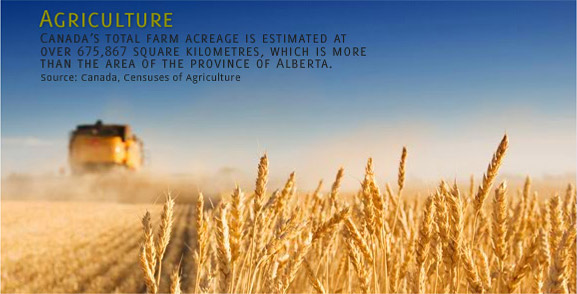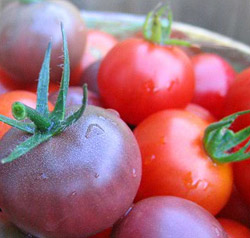Agriculture
In addition to guiding us on the ground, the global positioning system (GPS), combined with Canadian engineering, is helping Canadian producers save time, money and effort, while increasing safety. A Canadian company used GPS technology to develop an agricultural guidance system that greatly improves the distribution of fertiliser on fields both on the ground or from the air, a system that increases the cost-effectiveness of the whole process.
Overview of the main RADARSAT-1 Earth observation data applications

Text version - on the graphic about the agriculture
Canada's total farm acreage is estimated at over 675,867 square kilometres, which is more than the area of the province of Alberta.
Source: Canada, Censuses of Agriculture
Canada reports a 10 percent pesticide residue on fresh fruit and vegetables produced in this country Footnote 1
Farmers can use data acquired through satellites and other remote-sensing methods to assess soil water content and irrigation needs. In addition to enabling farmers to better predict precipitation or pest infestations, this technology can improve yields, save more crops or help farmers decide to grow varieties that are more resistant to drought and pests
This technology has enormous commercial potential throughout Canada and in the United States, where crop losses could be significantly reduced.
Observation of the Earth from space can make it possible to develop better farming practices. This is revolutionary for the agricultural community, which, through the use of this technology, hopes to generate large savings, while at the same time limiting the spread of chemicals that are harmful to our ecosystem.
Overview of the main RADARSAT-2 Earth observation data applications

Martian lettuce helps maximize the potential of greenhouses Footnote 2
Where better than the Canadian Arctic to simulate the environment on the planet Mars? Efforts are now being made to develop technology that will make it possible to survive on the Red Planet one day. The Canadian Space Agency operates a remotely controlled greenhouse on Devon Island to gain a better understanding of the design, operational and energy-saving requirements for northern facilities.
The technology used will have a direct impact on the Canadian greenhouse industry, which will benefit from improved greenhouse yield and autonomy. Other biology research and experiments also being conducted in the hostile environment of the Canadian Arctic will benefit this industry, as well as northern communities that want to develop their own agricultural potential.
